NVIDIA and ATI HDCP Compatible Graphics Cards Roundup
by Josh Venning on November 16, 2006 12:00 AM EST- Posted in
- GPUs
Playing a Blu-ray Movie
Before we look at the cards, we want to talk a little bit about our test platform for our HDCP testing in this review. Our Blu-ray drive we have for testing is the Pioneer BDR-101A Bluray player.
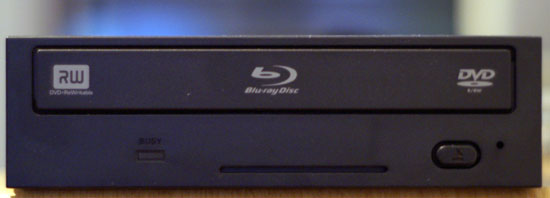
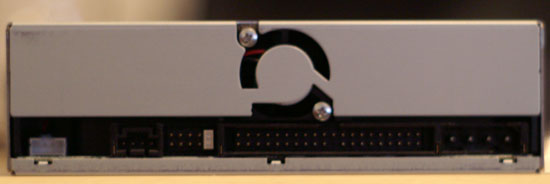
Just like watching a regular DVD, in order to watch a Blu-ray movie you'll need a Blu-ray player software. Cyberlink provided us with a version of its Power DVD software that has Blu-ray support (you'll currently need a different version of the player if you have a HD-DVD drive instead). Note that in order to play movies from your Blu-ray or HD-DVD drive over a digital connection, your playback software must have HDCP support or the movie won't play, but most manufacturers should include HDCP compatible software with their Blu-ray or HD-DVD drives.
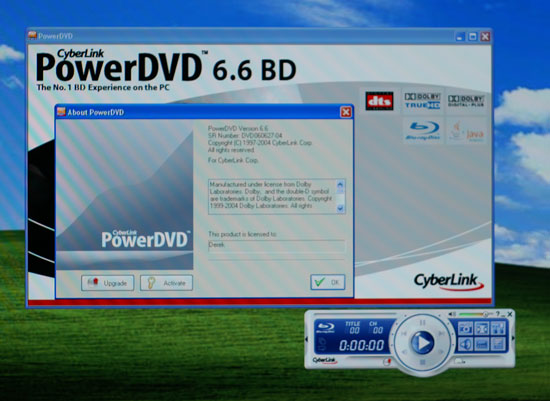
With the graphics card as the next step in the HDCP chain, not only must the GPU and card be HDCP compatible, but the graphics drivers must have HDCP support as well. Up until very recently, NVIDIA and ATI's public drivers did not include support for HDCP, but this has been added as of their latest Catalyst and ForceWare driver releases.
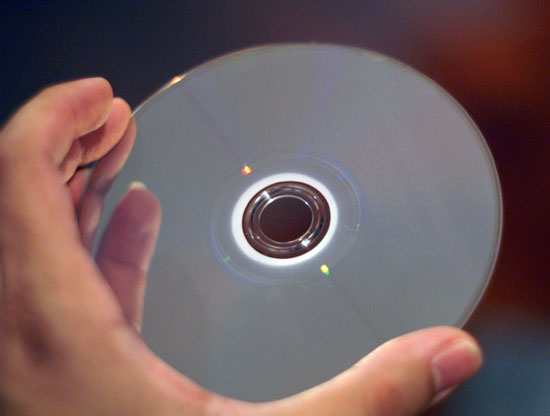
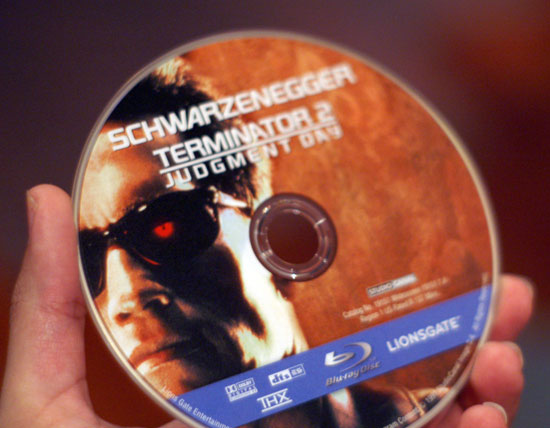
The last link in the HDCP chain is the display, and an HDCP compatible monitor or TV is required to play our Blu-ray movie. The TV we chose for this is a Westinghouse lvm-42w2, which fully supports HDCP and is a native 1080p display. Of course, you will need a Blu-ray or HD-DVD movie to make use of an HDCP setup to begin with, and the one we have for our testing is the movie "Click" which was one of the first 50GB Blu-ray discs available.
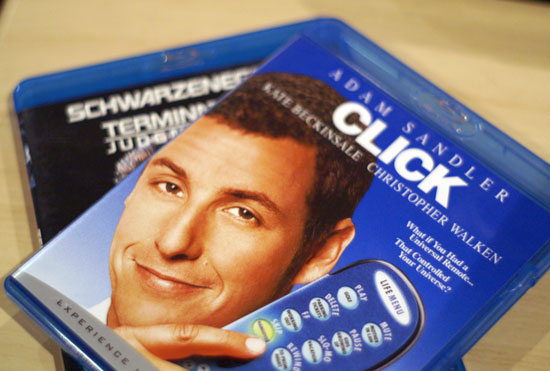
If any one of your hardware or software components within this chain does not support HDCP, then your Blu-ray or HD-DVD movie will not play. Most of the time an error message will pop up and give you an idea of what is wrong; If the graphics card is not HDCP compatible, PowerDVD gave us an error message saying, "fail to enable HDCP. Please switch to analog output (VGA, D-Sub) and try again." If the graphics drivers were incompatible, we got an error message along the lines of "please make sure your graphics drivers support HDCP." These are both fairly straightforward error messages, and for the most part, we were able to tell where the chain was failing whenever we had problems.
If the graphics card itself didn't properly support HDCP the result was a bit more in your face. For instance, we had a X1600 Pro sample with an HDMI port from Sapphire which was listed as being HDCP compatible, but we tried to play our Blu-ray movie we were greeted with a screen full of static.
For the most part, if the card you're using supports HDCP and you've got the right drivers and player, then you're good to go. It's also worth noting that not all outputs on the cards we looked at support HDCP, but where there are limitations we've done our best to point them out in the individual card sections.
Before we look at the cards, we want to talk a little bit about our test platform for our HDCP testing in this review. Our Blu-ray drive we have for testing is the Pioneer BDR-101A Bluray player.


Just like watching a regular DVD, in order to watch a Blu-ray movie you'll need a Blu-ray player software. Cyberlink provided us with a version of its Power DVD software that has Blu-ray support (you'll currently need a different version of the player if you have a HD-DVD drive instead). Note that in order to play movies from your Blu-ray or HD-DVD drive over a digital connection, your playback software must have HDCP support or the movie won't play, but most manufacturers should include HDCP compatible software with their Blu-ray or HD-DVD drives.

With the graphics card as the next step in the HDCP chain, not only must the GPU and card be HDCP compatible, but the graphics drivers must have HDCP support as well. Up until very recently, NVIDIA and ATI's public drivers did not include support for HDCP, but this has been added as of their latest Catalyst and ForceWare driver releases.


The last link in the HDCP chain is the display, and an HDCP compatible monitor or TV is required to play our Blu-ray movie. The TV we chose for this is a Westinghouse lvm-42w2, which fully supports HDCP and is a native 1080p display. Of course, you will need a Blu-ray or HD-DVD movie to make use of an HDCP setup to begin with, and the one we have for our testing is the movie "Click" which was one of the first 50GB Blu-ray discs available.

If any one of your hardware or software components within this chain does not support HDCP, then your Blu-ray or HD-DVD movie will not play. Most of the time an error message will pop up and give you an idea of what is wrong; If the graphics card is not HDCP compatible, PowerDVD gave us an error message saying, "fail to enable HDCP. Please switch to analog output (VGA, D-Sub) and try again." If the graphics drivers were incompatible, we got an error message along the lines of "please make sure your graphics drivers support HDCP." These are both fairly straightforward error messages, and for the most part, we were able to tell where the chain was failing whenever we had problems.
If the graphics card itself didn't properly support HDCP the result was a bit more in your face. For instance, we had a X1600 Pro sample with an HDMI port from Sapphire which was listed as being HDCP compatible, but we tried to play our Blu-ray movie we were greeted with a screen full of static.
For the most part, if the card you're using supports HDCP and you've got the right drivers and player, then you're good to go. It's also worth noting that not all outputs on the cards we looked at support HDCP, but where there are limitations we've done our best to point them out in the individual card sections.










48 Comments
View All Comments
rnemeth - Friday, December 1, 2006 - link
I personally think this article was extremely on point with the direction of media components in general. I think there will be many people out there, like me, who are planning on the convergence of the Media Center PC & Gaming PC. Vista (Ultimate) will bring Media Center to the masses and why shouldn't you be able to play your favorite DX10 "Game for Windows" on your big HDTV as well?
This article is ahead of its time. HDPC/DRM/HDMI/DVI/BR/HD-DVD/HDTV is all in the early stages. In the future, you will be able to buy or rent your high-def movie by downloading it to your PC with DRM finally figured out. This review shows us that it is not all there yet, but gives us an idea who is doing what, and what we need to look for.
You mentioned in the beginning of the article that you were looking for feedback to see how interested your audience is on this subject... count me as 1.
thejez - Sunday, November 26, 2006 - link
HDCP is a joke... look at how hard it is to understand and get this stuff running... not to mention you have upgrade all your hardware?? lol and who watches movies on their PC anyway?? do you people really sit huddled over your keyboard watching movies?? Why not invest in some better equipment for the family room and watch movies they way they were intended....but the difficulty in setting all this up makes it even more important that hdcp has already been cracked... i wouldnt let the movie industry tell you your hardware isnt good enough to buy their content... just buy what you want and "work" around the issue later... the cracks are only getting better.... we'll see HD-DVD Shrink soon enough...
KalTorak - Monday, November 20, 2006 - link
Careful - it's not safe to assume that higher bitrate content is more computationally difficult to decode than lower bitrate content. [In fact, I suspect they're weakly correlated the other way - lower bitrate is harder.]DerekWilson - Monday, November 20, 2006 - link
ahh ... very interesting ...it would make sense to me to say that both are true.
In the case where low bitrate means more aggressive high quality encoding, i absolutely see your point. But low bitrate can also mean lower quality (less information) at the same level of encoding -- in these cases lower bitrate will be easier to decode.
Thanks for pointing this out.
Badkarma - Monday, November 20, 2006 - link
Hi Derek,Can you comment on HD audio formats like Dolby TrueHD and DTS-HD for the HTPC? I know Bluray has yet to use these formats but how about HD-DVD on the HTPC. From what I understand, you could get these formats outputted via analog output on your soundcard, but I'm interested in HDMI. I know some of the HDMI video cards you reviewed have SPDIF passthrough via HDMI, however SPDIF cannot carry Dolby Digital +, TrueHD, or DTS-HD, it will only output DTS or DD. I'm holding back on a HDCP video card because HD audio is an important part of HD movies.
Thanks.
Ajax9000 - Sunday, November 19, 2006 - link
p.13 "Both the 8800 GTX and GTS are fully HDCP compatible, and HDCP is enabled through both DVI ports" p.22 "Some of the cards, like the HDMI Gigabyte 7600 GS and ASUS EN7600 GT, were only able to play our Blu-ray movies over HDMI and not through the DVI port. Conversely, we found that with our MSI NX7600 GT Diamond Plus, the Blu-ray content wouldn't play through the HDMI connection but it would through the DVI port."OK, so which cards (other than the 8800s) could do HDCP over both ports?
----
p.19 "The end result is that an NVIDIA card with more pipelines that is better at 3D performance will not necessarily be better at video decoding."
In other words overclocking (say) a 7600 is likely to give as good or better HD video results than using (say) a 7950GX2?
----
p.20 "In the future, we could see power consumption go down with acceleration enabled. As graphics hardware is better suited to processing video than a CPU, efficiency should go up when using hardware acceleration."
The results for the 9750GTs already seem to show this 147W average non-accelerated >> 142 for EVGA & PNY (although Gigabyte > 148W).
Adrian
chucky2 - Friday, November 17, 2006 - link
...can we get it added to these results just for comparison?Also, you don't happen to know when that'd be, would you? :)
Chuck
BigLan - Friday, November 17, 2006 - link
I noticed that in the cpu utilisation tests you said it was around 51% for no acceleration - was this because the player software is single threaded and so only used one core?Also, is click encoded in h264, or mpeg2 like the initial bluray discs?
DigitalFreak - Friday, November 17, 2006 - link
Now that the Xbox 360 HD-DVD drive is available and is proven to work with a PC, any chance on doing another round-up "real soon now" using HD-DVD? I'd really love to see the numbers for VC1 and H.264 decoding.Still amazed that the lowly X1600 card spanked all Nvidia cards but the G80 boards in CPU utilization.
Good job guys.
DigitalFreak - Friday, November 17, 2006 - link
BTW, the new releases from Fox on Blu-Ray use the H.264 codec. Behind Enemy Lines, Fantastic 4, etc. I think Behind... is already out.